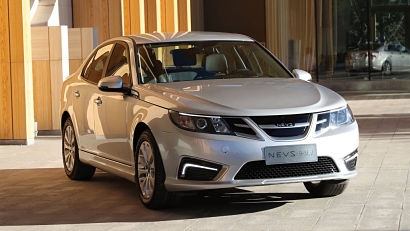
NEVS seeks to be the only car manufacturer in the world aiming to reduce the total number of cars on the road, an attitude that is shared by Trollhättan City, which wants to be a sustainable town and has a number of environmental goals including reducing residents' car ownership and car travelling. Researchers at the University of West Sweden will combine these needs and look at the possibilities of expanding the use of cars that are part of a system that deals with the use of the cars.
“Since we know that most cars are parked 95 percent of the time, it should be possible to make people think new and start sharing cars with others” said Nadia Kabir project manager at NEVS. “We are not only focusing on the positive environmental impacts - the fact that you can halve your car costs is also a very important incentive. We believe that such an arrangement would be appealing to many and are really looking forward to having this tested in practice”.
The project will utilise five electric vehicles (EVs) to investigate how drivers can use smart cities and autonomous cars in order to achieve a reduction in car numbers.
“The technology exists, but we know very little about how people react on this or about people's attitudes towards self-driving cars and their relationship with car sharing services” added Lars-Olof Johansson, researcher in computer science with a focus on work-integrated learning and project leader at the University West. “If we are to succeed in reducing car traffic, we need to start sharing services with each other - otherwise there won´t be fewer cars. Attempts made with self-driving cars have always been done in big cities. In size, there are many cities that are similar to Trollhättan in Sweden - but how it works in these is unknown”.
The main purpose of the project is to investigate and chart the existing mobility and transport habits of individuals, as well as their perceptions and experiences of shared self-driving transport with electric cars in practice. This will essentially be achieved by two major studies. The first will be a survey of residents' transport behaviour in Trollhättan, carried out with the help of families acting as study subjects whose behaviour can monitored in their everyday lives. The second will test an attempt to share electric cars between and within families.
“We want to find out how we can build services around this with the families as co-producers of apps or anything else that could appear” said Lars-Olof Johansson “We know that when users join and form services and digital applications, acceptance also increases.
The project itself will not utilise self-driving vehicles, but the results will be integrated into ongoing developing work investigating shared and autonomous vehicles. The SESMA project will be conducted throughout 2019 and 2020 in cooperation with NEVS, Trollhättans City and RISE. Drive Sweden has granted the project more than 3 million SEK and the project has a total budget of almost 7 million SEK.
It will have three main objectives:
Creation of a business model for manufacturers of connective, autonomous, electric and shared vehicles – to be carried out by NEVS.
Establish urban planning guidelines for transition to smart mobility in major cities – to be carried out by Trollhättan City.
Develop demonstrators of digital applications that support sharing economics and smart mobility in major cities. (Developed by all the actors of the project.)
Drive Sweden is a strategic innovation programme initiated by the Swedish government, funded by the Swedish Energy Agency, Formas and VINNOVA.
NEVS currently has approximately 660 employees and approximately 40 consultants in Trollhättan and was founded in 2012 after purchasing the assets of Saab Automobile AB following that company’s bankruptcy. The company is aiming to build a global portfolio of electric cars, mobility solutions and sustainable city deals. Its first electric cars will reach customers in 2019 after manufacture by a new factory in Tianjin, China. The company is also planning to build a new production facility with research centres in Shanghai, China and is also aiming to begin production in Trollhättan. The aim is to develop autonomous vehicles by the early 2020s, both for China and for the European market.
For additional information:

